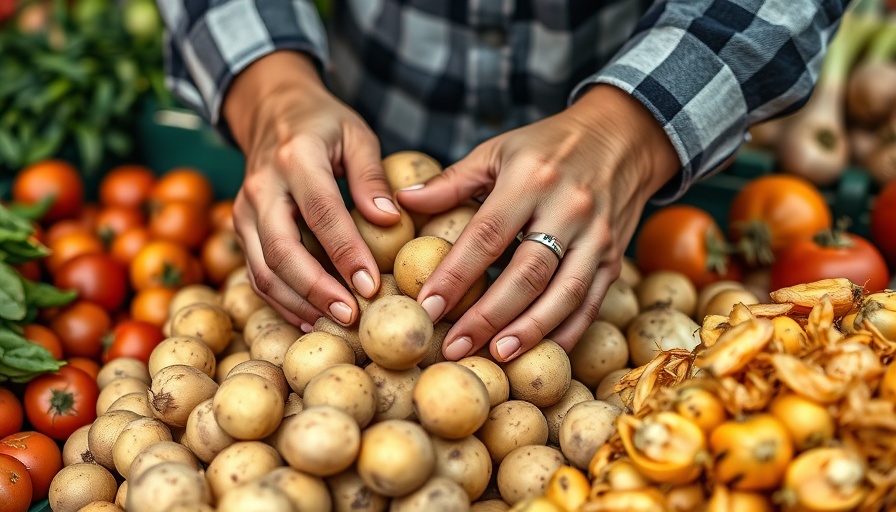
A New Perspective on Potatoes: Health Risks and Benefits
Potatoes are a staple in many diets across the globe, commonly prepared in countless ways—baked, mashed, fried, roasted, and more. Yet, the question remains: Are they a healthful choice? Recent studies offer a nuanced view, particularly regarding their impact on diabetes and high blood pressure.
Potatoes and Diabetes: A Complex Relationship
Research has long debated the role of potatoes in diabetes risk. A significant study from Harvard's Nurses’ Health Study revealed that higher potato consumption correlates with a greater likelihood of developing type 2 diabetes. Notably, it highlighted that deep-fried potatoes, like french fries, pose a much higher risk—nearly 20% greater—than baked or mashed forms. This calls into question the perception of potatoes as an ‘innocuous’ vegetable in dietary guidelines.
Further studies, including a meta-analysis from 2018, found that even everyday servings of potatoes increase diabetes risk by approximately 20%. However, contextual factors like preparation methods and accompanying diet must be considered. Boiled potatoes consumed within a balanced, whole-food diet demonstrated lower diabetes risks in countries like Iran, where such foods are integrated with a variety of fruits, vegetables, whole grains, and legumes.
Understanding the Glycemic Index of Potatoes
The Glycemic Index (GI) measures how quickly foods raise blood sugar levels. Potatoes generally have a medium to high GI, meaning they can cause spikes in blood sugar. But not all potato preparations are equal. For instance, cooling potatoes post-cooking increases resistant starch and reduces the GI by nearly 25%. Choosing low-GI potato varieties, such as Carisma and Nicola, may also provide a healthier option for managing blood sugar levels.
How Cooking Methods Affect Potato Health
The method of preparation plays a crucial role in determining the healthfulness of potatoes. Studies suggest that plain boiled potatoes have minimal impact on diabetes risk, unlike their fried counterparts. Consuming tons of fried potatoes significantly contributes to both obesity and insulin resistance, critical drivers of diabetes. It's crucial to prioritize cooking methods like boiling, steaming or baking while avoiding fried varieties.
The Implications of High Blood Pressure
Similarly, the relationship between potatoes and hypertension is concerning. Regular consumption of fried and processed potato products correlates with increased blood pressure levels. High intake of unhealthy fats can lead to heart issues, particularly crucial for those managing diabetes or hypertension. Rather than relying solely on potatoes, incorporating fresh vegetables, lean proteins, and high-fiber foods can mitigate risks.
Actionable Tips for Health-Conscious Consumers
For those who love potatoes, moderation is crucial. Here are some actionable tips to enjoy them healthfully:
Opt for smaller portions and incorporate them in meals alongside non-starchy vegetables.
Choose healthy preparation methods: Boil or bake potatoes instead of frying them.
Leave the skin on to maximize fiber intake.
Combine potatoes with healthy fats like avocado or olive oil, and lean protein to help stabilize blood sugar.
Additionally, consider substituting potatoes with lower-carb vegetables such as cauliflower and leafy greens that are nutrient-dense and low in GI.
Conclusion: Finding a Balance
In conclusion, potatoes can still play a role in a balanced diet, particularly for individuals aiming to maintain health conditions like diabetes or high blood pressure. However, it’s essential to adopt conscious eating habits and make informed cooking choices. Moderation, preparation methods, and overall dietary balance are key elements that contribute to healthier living. With thoughtful consumption, potatoes can remain a part of enjoyable meals without sacrificing health goals.
Ready to transform your meals? Explore more healthy recipes and tips for balanced eating!
#PotatoHealth, #DiabetesRisk, #HighBloodPressure, #GlycemicIndex, #HealthyCooking, #Type2Diabetes, #FrenchFries, #BalancedDiet, #ResistantStarch, #NutritionTips
 Add Row
Add Row  Add
Add 




 Add Row
Add Row  Add
Add 


Write A Comment